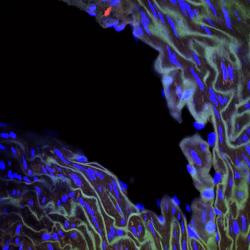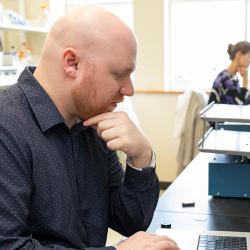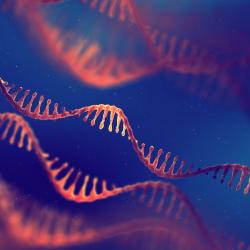Exploring the Role of Protein Synthesis in Health
Cell biologist Lanny Ling investigates protein synthesis and how errors in the process can either harm organisms or help them survive.
Proteins are an essential building block of life. Needed to maintain the structure, function and regulation of all living cells, proteins can be found everywhere in the human body—from our bones and tissue to our hormones and enzymes.
But what happens when the protein-making process goes wrong?
Jiqiang “Lanny” Ling, an associate professor of cell biology and molecular genetics at the University of Maryland, says that errors in protein production have profound effects on all organisms and can even contribute to disease.

“In bacteria, mistakes can lead to either significant growth defects or exceptional survivability and motility,” Ling explained. “In humans, however, faulty protein production can impair vital cellular functions and kill tissues. Mistakes can impact how the immune system recognizes antigens and produces antibodies. This often results in serious and sometimes irreversible damage.”
For Ling, protein synthesis is the key to discovering what causes disease on a molecular level and it’s the first step to determining how to counter those mechanisms. To uncover this important link between health and proteins, he investigates protein mistranslation, or the mistakes a cell makes when decoding instructions for producing proteins.
Since Ling joined UMD in 2018, his group developed novel systems for visualizing protein mistranslation in single-celled organisms and made discoveries about how this fundamental process can influence the health and survival of organisms at every scale, from single-celled beings to more complex animals including humans.
“Protein mistranslations can ultimately play several different, yet notable, roles in the outcomes of each type of organism,” Ling said. “We see the impacts of successful and unsuccessful protein synthesis every day, especially in common bacterial infections like Salmonella and how we fight them through antibiotics. But we’re learning that the role of protein translation in single-celled organisms and in pathogen-host interactions is extremely complex and still fairly unknown.”
Using simple cells to understand complex consequences
Ling’s research starts at the micro level with single-celled organisms, such as yeast or bacteria. Generally, environmental factors like oxygen levels or the presence of antibiotics can prompt cells to mistranslate. When bacteria and single-cell organisms encounter stressful conditions, they tend to make more mistakes while trying to produce new proteins.
Sometimes, protein mistranslation is fatal to bacteria because it can no longer sustain itself or reproduce. That’s why many traditional antibiotics, which target the structures responsible for protein translation in bacteria, are prescribed to combat bacterial infections. However, Ling’s team found that changes in protein translation caused by environmental stress factors are not always negative for the bacteria.
“In the past, scientists widely considered protein mistranslation to be an aberrant phenomenon that only causes harm to cells, but there’s now much more evidence that these kinds of mistakes might not always be detrimental to the organism,” Ling explained. “In our work, we have found that moderate levels of mistranslation can actually increase stress tolerance in bacteria like E. coli or Salmonella. That optimal level of mistranslation is critical for bacterial virulence.”
Ling’s group also found that some bacterial cells can mistranslate proteins while others can’t, even if they are genetically identical to each other. Despite having the same genes, individual bacterial cells could react differently under specific kinds of stresses like antibiotics. It’s like identical twins having the same DNA yet different personalities and behaviors, Ling explained, noting that this could be why some infections return in patients even after multiple doses of antibiotics.
“This is different from resistance, which is caused by acquiring a gene that allows the bacteria to gain resistance,” Ling said. “Antibiotic tolerance or persistence is not caused by DNA mutations, but instead a physiological mechanism that allows some bacterial cells to survive while others die.”
Ling added that this additional tolerance, and the ability to survive even in tough environments and stressful conditions, can make it easier for bacteria to invade hosts and cause illness in humans—contributing to the rise of superbugs, or infectious diseases that cannot be treated with conventional medicines.
These findings present a major red flag for scientists and health care professionals concerned about how these types of bacteria can impact human health and hoping to fight back with antibiotics.
“Bacteria that can mistranslate and gradually evolve to develop additional tolerance to stressors can make many of our treatments, such as antibiotics, much less effective,” he said. “Protein translation can be an adaptive mechanism that benefits the bacteria but harms us as potential hosts for these pathogens.”
Protecting human health for the future
Ling is now collaborating with other scientists, including his department colleague Associate Professor Antony Jose, to apply his knowledge of protein mistranslation in simple organisms to more complex, multicellular organisms. Together, Ling and Jose are working to characterize genetic mutations in the roundworm C. elegans and pinpoint their impact on specific protein-producing systems.
Ling also studies how problems in the protein production process can cause health conditions like microcephaly, brain atrophy or severe seizures in humans.
“With advancements in genetic sequencing technology, scientists have identified an increasing number of human mutations that alter protein translation mechanisms, which can lead to disease,” Ling explained. “We’re now able to explore how these genetic mutations that develop in early childhood are responsible for causing these serious cardiovascular and neurological diseases.”
Ling hopes this work on protein mistranslation will eventually lead to better ways to prevent and fight disease.
“There are more and more studies than ever referring to how protein translation errors can impact health, possibly even extending or reducing lifespans someday,” Ling said. “Our work has implications for how we currently approach disease and how we’ll fight incoming challenges like superbugs in the future.”







